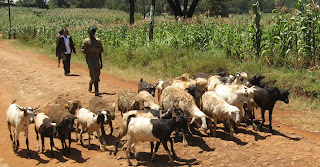 |
| An irrigation system for food production |
Through this technology, it is possible for the people of Turkana to be self-reliant by producing their own food if the state as well as non-state actors changed tact and embraced it.
The food situation in Turkana is ‘grave’ - people are dying of hunger and as much as humanitarian aid is important in saving them, let us think of allocating a portion of the millions we perennially sink into emergency relief to irrigate Turkana for enhanced food security. This could be advanced through the young people who have energy for cattle rustling. The youth can be engaged in meaningful agricultural projects to feed their communities as well as the country.
The Turkana have been dependent on relief food for the last five decades and “nothing seems to change”. The situation even seems to be worsening every year as the drought cycles become more recurrent and severe owing to climate change.
It is regrettable that irrigation has not been fully exploited and that some schemes that started were allowed to collapse. It is also unfortunate that during the rainy season, volumes of surface water are not harvested for irrigation but left to flow to waste. Israel, which is drier than Turkana, is food sufficient and feeds the world because food security is central to its development agenda. We can do better given our natural resource base endowment.






